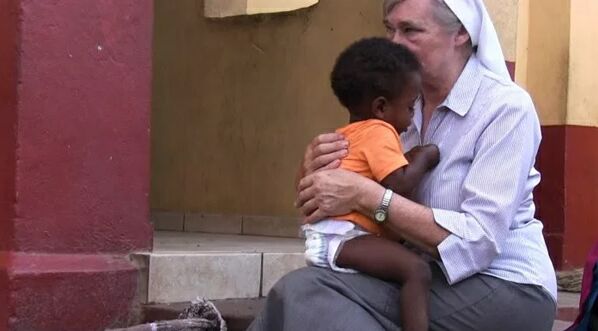13
December 2018
Spotlight.Africa
link to the original article.
Still taken from 'Denied Access' // Jesuit Institute South Africa
Sr Francis Grogan named Woman of Faith and Courage by Jesuit Institute
“I see myself as a link person
between so many other people, and that’s how it should be in a place like
Musina,” said Grogan.
Together with local and
international NGOs such as Future Families, Lawyers for Human Rights, faith
communities and police, to ensure that migrant families are not separated and
that those who need documentation are directed to the right path and children
are enabled to go to school
“We are all one. At core we
are all one. We’re all looking for the same thing. We are looking for dignity
and a place to feel safe”, she said as she confessed to feeling embarrassed by
the public acknowledgement of her work.
JI made the award on
International Human Rights Day (December 10) to honour the hard toil of the
Irish-born religious sister.
Ursula van Nierop, deputy director at the JI, handed the
certificate to Grogan and commended her for the deep spirituality, evident in
her work with those on the margins of society and in her deep love and
affection for the women and children arriving at the shelter.
Sr Grogan epitomised the JI’s
goal of “enlarging the horizons of hope”, van Nierop said.
The JI’s own work is often very
intellectual said the deputy director. But Grogan, like the saint whose name
she has taken, has decided that the best way to preach the gospel is to be very
close to the poorest and to only use words when necessary.
By using the analogy of us being
like links in a chain, Grogan challenged all present at the screening and
society-at-large to see the problem of statelessness, being a refugee or
an asylum seeker, not as an issue that only the government and well-organised
NGOs could help resolve.
While we might feel unable to do
much, we could at least inform the refugee or asylum seeker to the various
agencies that exist to help those who are undocumented, Grogan commented.
She runs a transit shelter for
refugee, migrant and asylum-seeking women and their children, mainly infants
and toddlers, in Musina which is a South African town on the border with
Zimbabwe.
By virtue of its geographical
location and because of the violent conflicts, food insecurity and worsening
economic conditions felt in neighbouring countries, Musina has become a
convergence zone for migrants entering South Africa.
Many arrive undocumented because
they were forced to flee their homes without warning, have lost or had their
documents and belongings stolen while in transit.
Women bear a further brunt of the
already desperate problem, that of sexual assaults. They are often raped by
gangsters who operate illicitly near the border offering to transport refugee
women and their children particularly, into South Africa. It is their way of
paying for their freedom the criminal smugglers tell them.
The women, mainly from Zimbabwe,
Burundi and the DRC, stay at the shelter while applying for refugee or asylum
seeker status before moving out into the bigger cities. It is a protracted and
frustrating exercise which can take years to come through.
The shelter in Nancefield around
20km from the Zimbabwe border had once been a church. It was later converted
into a women’s skills development centre and now it is a shelter for women.
The need for a shelter was
identified when the Zimbabwean economic crisis worsened in the early 1990s and
people fleed their homes in search of better lives. Today the shelter hosts
refugee and asylum-seeking women from as far afield as Burundi and the
conflict-torn eastern DRC.
To anyone who has seen her with
the women and their children, it is obvious that to them she is more than just
a link. For them, and for us, she is an inspiration and a reason not to despair
nor lose hope at a time when so much seems to be so wrong.

No comments:
Post a Comment